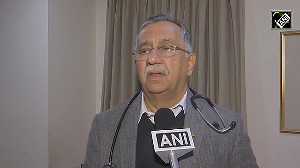The plunging global economy is an even bigger threat to the United States' national security than the al Qaeda terrorist network or proliferation of weapons of mass destruction, according to America's new intelligence czar.
Retired Admiral Dennis Blair, the Obama administration's Director of National Intelligence, in his first appearance before the US Congress, stated, "The primary near-term security concern of the United States is the global economic crisis and its geopolitical implications."
Traditionally, US intelligence chiefs always preface their opening remarks with either terrorist or nuclear proliferation threats, but Blair's first sentences in his testimony before the US Senate Select Committee on Intelligence was about the economy.
Blair said, "The crisis has been going on for over a year, and economists are divided over whether and when we could hit bottom. Some even fear that the recession could further deepen and reach the level of the Great Depression."
"Of course, all of us recall the dramatic political consequences wrought by the economic turmoil of the 1920s and 1930s in Europe, the instability, and high levels of violent extremism," he said.
"Though we don't know its eventual scale, it already looms as the most serious global and economic and financial crisis in decades," he added.
Blair pointed out, "Industrialised countries are already in recession and growth in emerging market countries, previously thought to be immune from industrialised countries' crises, has also faltered, and many are in recession as well."
"Even China's dynamic growth engines have taken a hit as they grapple with falling demand for their exports and slowdown in foreign direct investment and portfolio investments," he said.
Blair served notice that "the financial crisis and global recession are likely to produce a wave of economic crises in emerging market nations over the next year, prompting additional countries to request International Monetary Fund or other multilateral or bilateral support."
"Time is probably our greatest threat," he said. "The longer it takes for the recovery to begin, the greater the likelihood of serious damage to US' strategic interests."
Blair added, "Roughly, a quarter of the countries in the world have already experienced low-level instabilities such as government changes because of the current slowdown."
He noted that "statistical modeling shows that economic crises increase the risk of regime-threatening instability if they persist over a one or two year period."
"Besides," he added, "increased economic nationalism, the most likely political fallout for US interests, will involve allies and friends not being able to fully meet their defence and humanitarian obligations."
Blair said that the crisis for the United States poses a plethora of challenges and tracing its genesis spoke of how "it started in the United States, quickly spread to other industrial economies and then, more recently, to emerging markets."
He argued that "the widely held perception that excesses in US financial markets and inadequate regulations were responsible, has increased criticism about free market policies."
Blair acknowledged that this could make "it difficult to achieve long-time US objectives, such as the opening of national capital markets and increasing domestic demand in Asia."
Blair said, "It already has worsened questioning of US stewardship of the global economy and the international financial structure."






 © 2025 Rediff.com -
© 2025 Rediff.com -